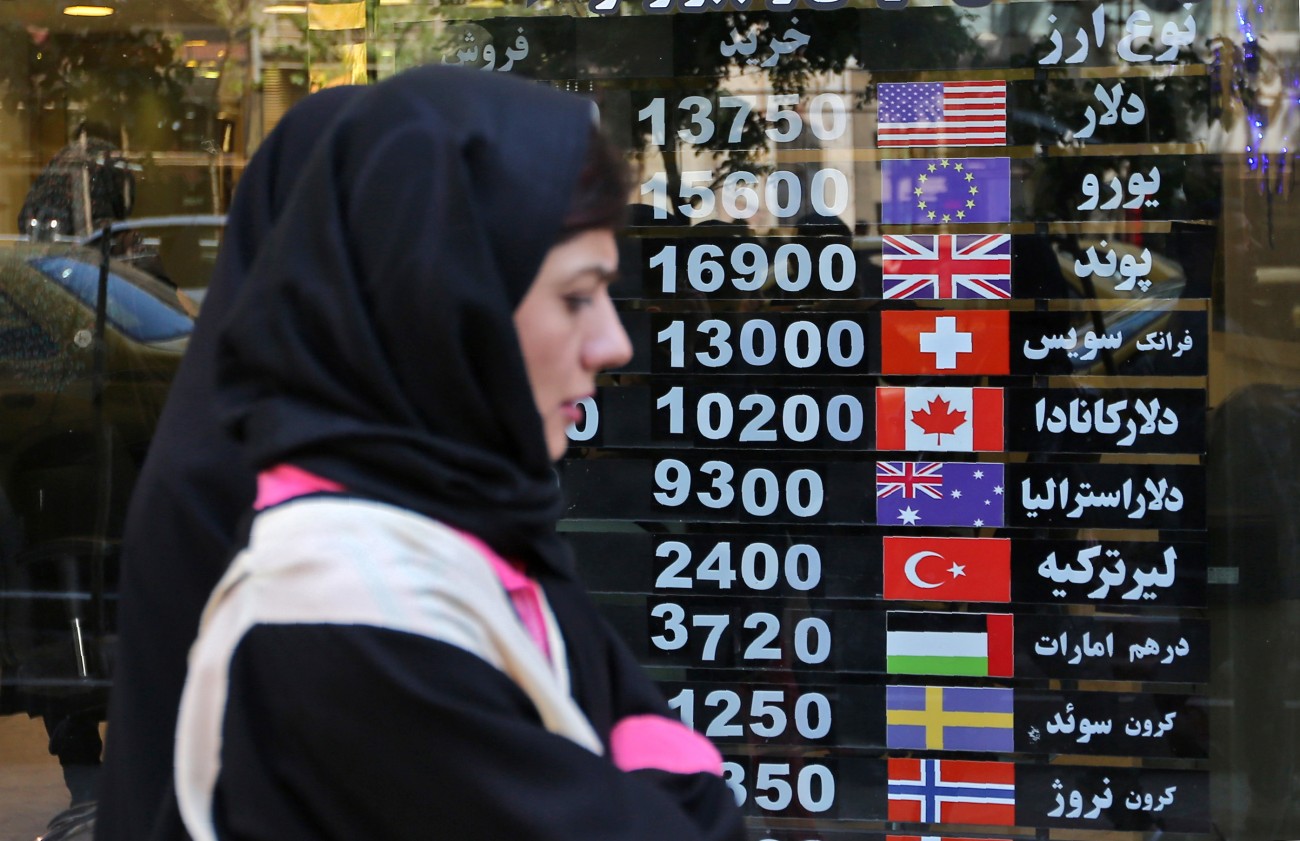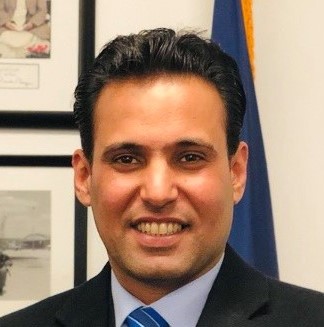

Introduction
One year ago, the U.S. withdrew from the 2015 nuclear deal — officially known as the Joint Comprehensive Plan of Action (JCPOA) — reached by the P5+1, the EU, and Iran. The Trump administration subsequently adopted a new and more aggressive Iran policy that it dubbed the “maximum pressure” campaign, reimposing sanctions, labeling the Revolutionary Guard a foreign terrorist organization, and trying to drive Iran's oil exports to zero. Amid rising tensions between the U.S. and Iran, we asked nine regional experts to assess the situation and answer one key question: Is the U.S. maximum pressure campaign working?
Viewpoints
-
Karim Haggag
Karim Haggag

On US Iran policy, there’s little coherence between means and ends
The difficulty in assessing the efficacy of the Trump administration’s policy of “maximum pressure” against Iran lies in the seeming absence of any discernible U.S. endgame vis-à-vis the Islamic Republic. As such there seems to be little coherence between means (withdrawal from the JCPOA, tightening the sanctions regime to include oil sales and Iran’s Islamic Revolutionary Guard Corps) and ends (rolling back Iran’s regional influence and imposing more stringent controls on its nuclear program).
Although oil sanctions will no doubt exact a heavy economic toll, more than a decade of multilateral sanctions did not manage to halt the expansion of Iran’s nuclear infrastructure and enrichment activities to the point of achieving a latent breakout capability. And while sanctions might force Tehran to curtail its level of material and financial support to its proxies, the escalating pressure will likely strengthen Iran’s determination to consolidate its presence in the various theaters of conflict across the region: Syria, Lebanon, Yemen, and Iraq.
Tellingly, the maximum pressure policy has not prompted a change in the administration’s aversion to regional military adventurism. While U.S. policy is anchored in a worldview that sees much of the region’s instability as originating in Tehran, the task of confronting Iran militarily is seemingly left to America’s regional allies, as was indicated in Secretary Mike Pompeo’s Cairo speech.
The objective of a negotiating process that would impose more stringent constraints on Iran’s nuclear program seems to be similarly out of reach. Iran’s adherence thus far to the JCPOA and the evisceration of any trust between Washington and Tehran make the prospect of a more expansive deal that would encompass Iran’s missile arsenal and its regional posture highly unlikely.
The overall results of this policy are therefore likely to be mixed. What does seem certain, however, is that the conflict between Washington and Tehran has only become further entrenched, and has itself become a driver of regional instability. Ameliorating this conflict is a prerequisite for addressing the others in the region. Unfortunately, the policy of maximum pressure has only made this objective harder to achieve.
Karim Haggag is a professor of practice in the School of Global Affairs and Public Policy at the American University in Cairo.
-
Barbara Slavin
Barbara Slavin

A cruel and counterproductive Iran policy that risks escalation
For a year, the Trump administration has been able to have its baklava and eat it too when it comes to the Iran nuclear deal. However, on May 8th Iran signaled that its forbearance is coming to an end, giving the other parties to the agreement 60 days to find reliable ways to trade with Iran or it will begin to exceed limits on its nuclear program. By seeking to reduce Iranian oil exports to zero, the U.S. has seriously miscalculated. It has pushed Iran into a deep recession after several years of growth. But this “maximum pressure” policy has so far not compelled Iran to pull back from regional interventions, free American prisoners, or stop repressing the Iranian population. Now a new nuclear crisis looms, years before restrictions on Iran’s program were due to sunset.
One reason U.S. policy seems doomed to fail is that it conflates behavior change and regime change. By flirting with the latter and constantly questioning the legitimacy of the Islamic Republic, the Trump administration has provided zero incentive for Iran to negotiate a new and more concessionary set of understandings with the United States. It is also doubtful that economic pressures will incentivize Iranians to rise up and overthrow the regime. People struggling every day for survival rarely have the energy to revolt, especially in a region where popular uprisings have led to prolonged civil strife and ruinous foreign intervention. Iranians also remember how their 1979 revolution turned out and prefer evolutionary change to violent upheaval.
Iranian officials had seemed willing to wait out a single Trump term in hopes that a successor administration would return to the 2015 nuclear deal or at least seek new negotiations on more realistic terms. However, now Iran’s patience is ending and it is seeking more leverage for future talks. Chances for U.S.-Iran conflict are also rising given the proximity of U.S. troops to Iran-backed forces in Iraq, Syria, and Afghanistan, as well as the Persian Gulf and Horn of Africa.
Barbara Slavin is director of the Future of Iran Initiative at the Atlantic Council.
-
Alex Vatanka
Alex Vatanka

Tehran seems willing to talk, but not from a position of weakness
It took the Iranians exactly one year to respond to President Donald Trump’s unilateral withdrawal from the 2015 nuclear deal. On May 8th, Tehran announced it will suspend parts of its cooperation and gave the other remaining signatories (China, France, Germany, Russia, and the UK) 60 days to make the agreement workable for all parties. While Iran stayed in the deal the U.S. has piled on new sanctions, crushing the Iranian economy. Thanks to the threat of U.S. secondary sanctions, Iran’s oil customers have abandoned it and its oil exports have fallen from around 2.5 million bpd in May 2018 to under 1 million today.
Iran desperately needed to get itself out of this bind, but without giving the Trump administration any pretext for a military conflict. Over the course of the last year, the catchphrase in Tehran was to avoid the “American trap,” meaning that Iran had to stay both in the nuclear agreement and remain committed to the Non-Nuclear Proliferation Treaty (NPT). And yet, as the impact of the sanctions increased, Tehran needed to regain some leverage. With its partial suspension, Tehran is hoping to do just that. It is staying in the framework of the nuclear deal but with the hope that its threat to suspend its participation in 60 days’ time — unless progress is finally made — will force the Europeans in particular to buy Iranian oil, the mainstay of its economy. From Tehran’s perspective, this partial suspension is aimed at calling not only Trump’s bluff, but also Europe’s. Tehran appears reasonably sure that Trump has no appetite for war and has been pursuing a “maximum pressure” campaign against Iran at a small cost to Washington. The Europeans are committed to the nuclear deal in words, but not sufficiently in actions — or at least that’s what the Iranians seem to think.
Iran still hasn’t found a way out from this conundrum though, which is inextricably linked to the 40-year history of U.S.-Iranian hostilities. When Foreign Minister Javad Zarif was in the U.S. recently, he signaled Iran’s desire for negotiations with the Trump administration. Initially, the Iranians had believed the Trump presidency to be an aberration and opted to wait him out. They now realize there is a strong chance he will be re-elected in 2020. Given the severe impact of sanctions, and given that Europe, China, and Russia are mostly unable to do anything about American pressure on Iran, Tehran sees talking to Trump as humiliating but preferable to risking six more years of American pressure. While Zarif was in the U.S., some prominent officials in Tehran — including Ali Larijani, the speaker of the Iranian parliament, and Qassem Soleimani, the infamous Revolutionary Guards general — dismissed the idea of talking to Trump as a “strategic mistake” and “humiliation,” respectively. Such remarks are probably also aimed at maintaining pressure on Washington. Zarif would have never come to New York if he did not have a message from the leadership in Tehran to deliver to the Trump administration. All in all, Tehran seems willing to talk to Trump, but not from a position of weakness, hence its decision to partially suspend its nuclear commitments. Much, of course, will depend on Washington’s next move.
Alex Vatanka is a senior fellow at the Middle East Institute and specializes in Middle Eastern regional security affairs with a focus on Iran.
-
Mark Dubowitz
Mark Dubowitz

So far, US policy seems to be working, albeit unevenly
The Trump administration has pursued an Iran policy based on the use of all instruments of national power — economic, diplomatic, and military deterrence — to stop Tehran from engaging in a wide array of aggressive and malign behaviors that defy global norms. So far, it seems to be working, albeit unevenly.
The most successful part of the strategy has been the reinstatement of sanctions. Scores of foreign investors, including major multinationals, are abandoning the Iranian market. The IMF and World Bank now forecast a deepening recession. The value of the rial is plummeting while inflation skyrockets. Oil exports have fallen from 2.5 million bpd to under 1 million bpd, costing the regime billions at a time when it is desperate for hard currency. Tehran is slashing transfer payments to its surrogates like Hezbollah, Hamas, Shiite militias, and the Assad regime.
Economic pressure is rising in spite of European efforts to salvage the nuclear deal by preserving economic incentives for Tehran, including setting up special purpose vehicles for international payments, resisting the expulsion of Iran from the SWIFT financial messaging system, and deterring compliance with U.S. sanctions by activating a blocking statue. So far, these efforts have had limited impact.
The administration’s strategy to counter Iranian influence in the Middle East looked like it was on life support thanks to President Donald Trump’s withdrawal of U.S. troops from Syria. After a sustained backlash, he has partially walked back his promise of a full troop withdrawal. Trump’s principal advisers recognized that the presence of U.S. forces in Syria denied key terrain and natural resources to Iran, Hezbollah, Russia, and the Assad regime, while costing the U.S. relatively little in terms of blood and treasure.
The administration is strengthening its regional posture. It has provided strong support for Israel to destroy Iranian military infrastructure in Syria. It also has moved an aircraft carrier strike group and bomber task force to the region in response to intelligence that Tehran is planning attacks against U.S. assets or allies. The credible threat of overwhelming force is essential to effective deterrence to prevent further Iranian escalation.
The Trump administration’s Iran policy suffers from a lack of bipartisan support. If Democrats retake the White House in 2020, the new president is likely to re-enter the JCPOA and suspend sanctions once again, though he or she will face the prospect of key restrictions on Iran’s nuclear, missile, and military programs lapsing during their first and second terms.
With the designation of the IRGC as a foreign terrorist organization, the push to drive Iranian oil exports to zero, and other planned steps, the Trump administration, with support from Republicans in Congress, is moving to build a wall of deterrence to keep companies out of Iran even if a new president tries to lift sanctions as part of a reentry into the JCPOA.
Iranian Supreme Leader Ali Khamenei may decide to play for time, hoping for Trump’s defeat in 2020. But with sanctions biting and the economy in turmoil, Tehran may now welcome a diplomatic process whose purpose is to blunt the “maximum pressure” campaign.
Mark Dubowitz is the chief executive of the Foundation for Defense of Democracies, a Washington, D.C.-based nonpartisan policy institute, where he leads projects on Iran, sanctions, and nonproliferation.
-
Ruba Husari
Ruba Husari

Maximum pressure will bite, but Iran will weather the storm
In launching a campaign of “maximum pressure” against Iran to force it to change its policies, oil came to be the weapon of first resort for the Trump administration. The aim was — and still is — to inflict maximum damage by hitting directly at Tehran’s coffers that finance what the U.S. considers hostile regional activities. But oil is a problematic weapon, and the results so far are not decisive.
A few months after re-imposing sanctions against Tehran, waivers had to be applied to a handful of buyers to shelter certain foreign policy priorities and objectives from the impact of using the oil weapon against Iran, especially big buyers of Iranian crude such as China and India. Manipulating the oil market by forcing a cut in supply has a domestic cost too; gasoline prices at the pump inevitably climbed higher. Yet, on balance, Iran still managed to sell around 50% of its pre-November 2008 oil exports between November and April.
In stepping up the maximum pressure campaign by eliminating the waivers on April 22, the U.S. hopes to rely on U.S. and Mideast Gulf oil production to mitigate the impact of the stricter zero Iranian oil exports policy. That’s not straightforward to achieve either though. First, there’s the issue of crude grade. U.S. crudes are on the light side while the targeted Iranian barrels are more of the medium and heavy quality. Second, OPEC producers, especially Saudi Arabia, which has the biggest chunk of spare capacity, have their own priorities. Riyadh has already made clear it will not increase supply in response to oil price jumps on U.S. policy announcements, but only when the fundamentals warrant it, i.e. when it determines there is an actual shortage of wet barrels on the market.
Defiant Iran insists it will find ways to continue exporting its oil to thwart the most recent measures. Just as 40% of Iranian crude exports were shipped “off radar” in the past six months, a ruse Iran has excelled at by switching off transponders on tankers at sea to avoid satellite tracking, there will likely be more of these stealthy crude shipments in the coming months. Add to that the perfection of the art of smuggling, or the “grey market,” as Iranian oil officials call it. That makes Iran dependent on traders and companies not big enough to worry about being penalized by the U.S. financial system.
It will be a tall order for Iran to try to keep its economy afloat on oil revenue but Iranian crude exports will certainly not go down to zero. Maximum pressure will bite but will not achieve the objective of the exercise; the Iranian regime will not collapse because it’s exporting less oil, nor is it about to withdraw political leverage it has built over many years in the region.
Ruba Husari is a non-resident scholar at the Middle East Institute and the managing director of OZME Consultants, a Dubai-based advisory and consultancy firm focusing on the oil and gas sector in Iraq and the Gulf region.
-
Mohammed Shummary
Mohammed Shummary

For Iran, the cost of confrontation is less than that of bowing to US pressure
The Iranians believe that the agreement they reached with U.S. and other powers in 2015 represents the maximum of what Iran can offer while maintaining its regional standing. They also believe that the Trump administration doesn't seek to reach a fair agreement that won’t humiliate the Islamic Republic. They frequently evoke the experiences of Iraq, Libya, and Sudan regarding weapons of mass destruction, which made clear that making concessions will not protect their regime. Therefore, they refuse to return to the negotiating table and think that the U.S. should respect existing international commitments.
On the one hand, with Israel being a technologically advanced nuclear power, backed by the U.S., and in light of ideological considerations, the Iranians think that there is a need to find a strategic balance that preserves the Islamic Republic’s regime. Given the multilateral threats they face in the region, such as the U.S. military presence, tensions with Saudi Arabia, the Gulf Cooperation Council’s significant weapons arsenal, and the Turkish military’s weight, having an equivalent arsenal and military capabilities is essential for Iran’s national security.
On the other hand, Iran’s regional role, as realized by its decision-makers, has an ideological basis, including defending Shiites. This is integral to Iran’s aspirations to play a leading role in the region, and its close relations with groups and forces throughout the Middle East are an extension of this.
The American pressure campaign is seen by Iranians not only as a threat to their security and interests, but also as an effort to humiliate them, which does not fit with the Iranian character. For them, the cost of confrontation will be less than the cost of bowing to that pressure. It is difficult to predict the consequences of the current escalation, and one cannot rule out the possibility of a military confrontation, in light of the policies of pressure and brinkmanship adopted by the two sides, which could blow up and result in a direct or indirect confrontation.
Mohammed Shummary is a lecturer in the College of Political Science at al-Nahrain University in Baghdad.
-
Przemyslaw Osiewicz
Przemyslaw Osiewicz

Dashed hopes and new threats for the EU and Iran
Iran’s withdrawal from some provisions of the JCPOA has put European powers in a tough spot. The U.S. administration has criticized the European attitude toward the Iranian regime for a long time, and now it seems that President Donald Trump and Secretary Mike Pompeo may say: “We told you so.” Yet the Iranian decision was triggered by the reinstatement of U.S. sanctions last year, not by any political decision on the part of the EU and its members.
It was the EU, or more precisely France and Germany, that did whatever they could to save the JCPOA in 2018. They even set up a special channel for transactions with Iran to circumvent U.S. sanctions. Although EU officials can blame the U.S. administration for the current crisis, it does not change the fact that the Europeans and Iranians will pay the highest price for it. If there were a military intervention in Iran, its consequences would affect Europe both politically and economically.
The EU will likely wait for the other JCPOA signatories to react, particularly Russia and China, and for the time being Brussels’ actions will be limited to political statements condemning the decision. The most likely scenario is that all permanent members of the UN Security Council will try to exert more diplomatic pressure on Iran. China and Russia will at least pretend that they intend to support the Europeans in this case, although in reality they do not have to do that. What is more, such actions would not be convergent with their interests. The worse relations between Western powers and Iran are, the better for the Chinese and Russians.
Przemyslaw Osiewicz is a non-resident scholar at the Middle East Institute and an associate professor at Adam Mickiewicz University in Poznan, Poland, specializing in EU policy toward the MENA region, Iran, and Turkey.
-
Gönül Tol
Gönül Tol

US policy puts Turkey in a tough spot
The U.S. strategy to exert “maximum pressure” on Iran puts Turkey in a difficult position. As a country that has close trade and energy ties to Iran, Turkey has always been critical of the Trump administration’s decision to slap sanctions on Iran. Washington’s decision not to reissue waivers in May allowing importers, including Turkey, to buy Iranian oil without facing U.S. sanctions has further fueled the dispute between the two NATO partners. Turkish Foreign Minister Mevlüt Çavuşoğlu recently announced that Turkey and Iran are working to establish a new trade mechanism to bypass U.S. sanctions. At a time of increasing pressure from Washington, both Iran and Turkey see each other as important partners. The frequency of high-level visits between Turkish and Iranian officials and Iran’s effort to tone down its pressure on Turkey over the Idlib question underscore the importance of maintaining cooperation despite U.S. pressure in both capitals.
During a recent visit to Tehran, Turkish Minister of Transport Mehmet Cahit Turhan reiterated Turkey’s desire to triple bilateral trade and said the U.S. sanctions cannot change Turkey-Iran relations. But the figures show they already have. Despite the defiant tone, Turkey has been complying with the sanctions regime. It has curbed its oil imports from Iran since May 2018, when the U.S. decided to withdraw from the JCPOA. The challenge now is to find an alternative source of oil. Russia and Iraq are the two main options, but they pose other challenges. Both are costly, Turkish-Iraqi energy partnership is complicated due to Ankara’s 2014 decision to allow the Iraqi Kurds to export their oil independently of Baghdad, and purchasing more oil from Russia would make Turkey even more dependent on Moscow at a time when the West is already worried about Moscow-Ankara ties.
The U.S. decision to double down on its efforts to isolate the Iranian regime comes at a time when the Turkish economy is struggling and the U.S. is threatening sanctions over Ankara’s decision to purchase the Russian S-400 missile defense system, leaving Turkey little room to maneuver. It cannot afford to take on the U.S. amid an economic recession and with a diplomatic crisis looming on the horizon.
Gönül Tol is the founding director of the Middle East Institute’s Center for Turkish Studies.
-
Eran Etzion
Eran Etzion

For Israel the glass is three-quarters full
Washington’s “maximum pressure” doctrine might just as well have been designed in Tel Aviv — in fact, according to critics, it may have partially been. It certainly aligns perfectly with Israel’s interests and with newly-elected Prime Minister Benjamin Netanyahu’s political agenda. Israel sees itself as a full partner in this strategy, and all of the state’s assets are working diligently to implement it.
The official Israeli narrative, in sync with America’s, outlines the goal as “pushing Iran back to the negotiating table,” broadening the scope of the deal to include non-nuclear issues like long-range missiles and support for terrorism, and driving Iran and its various proxies, first and foremost Lebanese Hezbollah, out of Syria.
When it comes to U.S. Iran policy one year on, Israel sees a glass three-quarters full. Sanctions are in place, Iran’s economy is badly hurt, oil prices are in check, multiple Iranian entities have been designated (including the infamous Quds Force), and the Europeans — who have been “designated” as almost enemies of the Jewish state, mainly due to their defiance of U.S. Iran policy — have not been able to effectively circumvent the sanctions and compensate for their damage.
The level of confrontation between Israel and Iran also remains under control, both in Syria and in the Gaza Strip. However, it’s worth noting that the last round of violence in Gaza was triggered by Iran’s proxy, Palestinian Islamic Jihad.
The empty quarter of the glass consists of the fact that there is no indication that the strategy’s stated goal is actually being achieved. Iran shows no sign of returning to the negotiating table. In fact, it has just signaled a partial withdrawal from the JCPOA.
The question that Israel and its American patron will have to wrestle with is: Is there a maximum to the maximum pressure doctrine? Is there a point at which it will be reviewed?
Israel’s real answer — which won’t be announced — is that there is no such point. Traditionally, confusing means and ends is not alien to Israel’s strategic planning. In this case too, sanctions will suffice as an end in themselves.
Eran Etzion is a non-resident scholar at the Middle East Institute, founder of the Yashar Party, and former Israeli deputy national security advisor.










